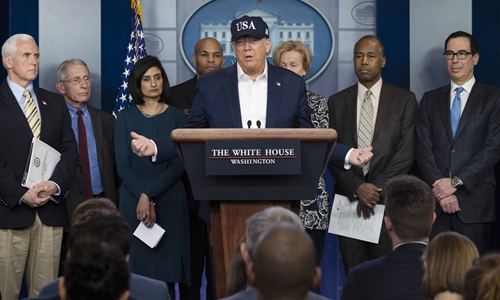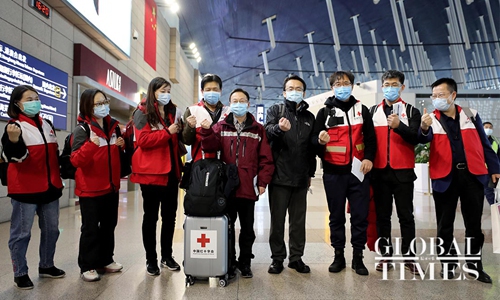HOME >> CHINA
Trump tweet infuriates China
By Yang Sheng Source:Global Times Published: 2020/3/17 16:48:40 Last Updated: 2020/3/18 0:14:57
China will never ‘surrender’ to US moves to politicize virus source

US President Donald Trump gives a press briefing about the COVID-19 alongside members of the Coronavirus Task Force in the Brady Press Briefing Room at the White House in Washington DC on Saturday. Photo: AFP
US President Donald Trump using the term "Chinese Virus" to refer to the COVID-19 in his tweet is an act of inability and irresponsibility, as he wants to make Americans to blame China and cover his own administration's terrible response to the predictable outbreak and his failure to ease panic in the US stock market, said Chinese experts on Tuesday, adding that hyping up racism and anti-China sentiment won't help the US deal with the pandemic at all.
The Chinese Foreign Ministry expressed strong indignation and firm opposition to Trump's tweet calling COVID-19 the "Chinese Virus."
Foreign Ministry spokesperson Geng Shuang said at a press briefing Tuesday afternoon that Trump's act stigmatizes China, which China strongly condemns.
"The World Health Organization and the international community are clearly opposed to linking viruses to specific countries and regions and to stigmatizing them," Geng said. "We urge the US side to immediately correct its mistakes and stop making groundless accusations against China."
Where the virus had come from should be a topic for science rather than politics, and by arrogantly provoking China at this juncture, the situation that the US and many other countries are being confronted with will get worse, especially the stock market, as the two biggest economies of the world could see a new conflict amid a pandemic that has already brought serious harms to the world economy, analysts warned.
Some observers noted that Trump's tweet could be a reaction to a tweet sent by Chinese Foreign Ministry spokesperson Zhao Lijian on his personal Twitter account that asked the US to be transparent about its epidemic situation, as Robert Redfield, director of the US Centers for Disease Control and Prevention (CDC), openly admitted last week at a hearing at the House of Representatives on the outbreak, that some COVID-19 deaths have been misdiagnosed as influenza in the US.
On Monday, in a phone call requested by US Secretary of State Mike Pompeo to Chinese State Councilor Yang Jiechi, Pompeo conveyed strong US objections to China's "efforts to shift blame for COVID-19 to the United States." The secretary stressed that "this is not the time to spread disinformation and outlandish rumors," according to the website of the US Department of State.
Yang, a member of the Political Bureau of the Communist Party of China (CPC) Central Committee and the director of the Office of Foreign Affairs of the CPC Central Committee, expressed strong objections over Washington's intent to "slander and smear China's efforts" in containing the COVID-19.
Yang said China has been open, transparent, and responsible in sharing information about COVID-19 with the WHO and other countries, including the United States, and these prevention and control measures adopted by the Chinese government have bought time for global prevention and control work, Xinhua reported.

Police officers talk to people in the streets on Tuesday in Tours, France amid the spread of the COVID-19. French President Emmanuel Macron asked people to stay at home to avoid the spread of the virus, saying only necessary trips would be allowed and violators would be punished. Photo: AFP
Time to be toughAccording to the facts, it was the US politicians who started the rumor offensive and began spreading baseless conspiracy theories, such as Senator Tom Cotton's claim that "the virus is related to China's bioweapon program" to insult and smear China without any hard evidence, and Pompeo also continually called the epidemic "Wuhan virus" despite the WHO formally naming it COVID-19 to avoid discrimination.
Some Chinese analysts worry that Zhao's tweets may cause the US to retaliate, and they blame Zhao for "infuriating" the US. They also thought Zhao was repeating "the wrong conspiracy theory" similar to what US politicians use to smear China.
Jin Canrong, associate dean of Renmin University of China's School of International Studies in Beijing, disagrees with this opinion. He told the Global Times on Tuesday that it is totally reasonable for Zhao to question the US and to urge it to be transparent.
Because the flu season in America started in September, and in October, the US military delegation came to Wuhan for the Military World Games, so it is totally possible that US military personnel unintentionally brought the virus to China, since at that time, no one in China knew the existence of COVID-19 if it really originated in the US, Jin said.
Zhao's question for the US was neither an accusation nor a rumor, but a reasonable query that is totally different from US politicians' groundless rumors and insults against China, Jin noted. "The US should answer this question and be transparent to not only China, but also its own people and the rest of the world."
After the Trump's tweet was released on Tuesday, more Chinese experts noted that this is not the time to blame Zhao and "surrender" to the US, as he only raised a reasonable query rather than spreading disinformation, and it is time for China to be tough in striking back against the discriminatory and racist stance of the US.
Distracting attention
The historic decline of US stock markets since the last financial crisis and appalling reaction to the epidemic situation made Trump lose support from Americans, so this also made him want to distract domestic attention from criticizing his lack of responsibility by blaming China, said Jin.
However, this tactic may neither help Trump to regain support nor protect US people from COVID-19, and according to the current feedback from the US public on the internet, it seems US people aren't buying Trump's tactics to distract their attention, said Diao Daming, a US studies expert from Renmin University of China.
Trump's irresponsible tweet that offended China seriously is likely to trigger a "circuit breaker" for the stock market again as the tweet signaled a potential conflict launched by the US against China, amid the pandemic, said Lü Xiang, a research fellow on US studies at the Chinese Academy of Social Sciences (CASS) in Beijing.
Volatility in US stocks surged to a record after benchmark indexes suffered the biggest rout since 1987, Bloomberg reported on Tuesday. The Cboe Volatility Index closed Monday at 82.69 as the S&P 500 Index tumbled 12 percent. The index's previously highest rating was 80.86 on November 20, 2008.
At this moment, countries which become impacted by the pandemic urgently need cooperation rather than being blamed so that the stock market can at least see some positive signs, otherwise it may only add more uncertainty and panic, Lü said. "If Trump can't stop the current trend and potentially makes it worse [due to lack of management], when the stock market crashes to a lower level than before he got elected four years ago, he will surely lose the election."
For the next step, based on Trump's current stance, his administration may potentially encourage those US firms which are particularly affected by COVID-19 to sue China for "compensation" or force China to pay for US losses in the pandemic, Jin said.
Trump could also further blame China on many other issues, such as unemployment and poor economic performance, so that he can fool US voters to forgive or ignore his administration's undesirable performance. He would then use such excuses to manipulate the exchange rate of the US dollar and sanction China's high-tech firms to force manufacturing industries to return to the US, or even tear up the signed trade deal to divert domestic attention, Chinese experts commented.
No matter what he does, if he turns provocations into concrete actions, China would surely retaliate and the world economy would be further compromised, Jin noted.
Consequences of racism
Yang told Pompeo via phone call on Monday that "any scheme to smear China will be doomed to fail" and China will counter such moves with determination.
The US heavily relies on imports of China-made medicines and medical materials. Based on humanitarian principles, China will keep providing assistance worldwide and won't cut off supplies to any country. But if the US provokes China, it would make it very difficult for China to assist the US, experts said, and innocent Americans who need masks and vital drugs badly will likely pay for the inability and ignorance of the Trump administration, said a Beijing-based expert on epidemic prevention and control who asked for anonymity.
Chinese pharmaceutical companies have supplied more than 90 percent of US antibiotics, vitamin C, ibuprofen and hydrocortisone, as well as 70 percent of acetaminophen and 40 to 45 percent of heparin in recent years, the New York Times reported on March 11.
An article published on March 4 by the Xinhua News Agency said that if China banned the export of drugs, "the US would sink into the hell of a novel coronavirus epidemic," so the US should be grateful rather than accuse China for political purposes.
The Beijing-based expert noted that Chinese professional teams have held many video conferences with US professionals to share data and keep them updated, and that China's public health authorities have also been communicating closely with the US CDC throughout the outbreak.
"So how dare the Trump administration blame us? They were already informed, and still they failed to make efforts to prevent and control the outbreak. They can't just cover up their inability by blaming China and fool their own people," he noted.
White House trade advisor Peter Navarro told CNBC on Monday that he's preparing an executive order that "would help relocate medical supply chains from overseas to the US," as he believes the US should reduce dependency on drug imports from other countries like China.
Foreign Ministry spokesperson Geng said at the press conference that "this is the wrong prescription that may harm many more ordinary Americans."
Chinese experts said there could be only one result of this - the US people will need to spend more money but can only buy less drugs.

China dispatches a team of nine medical experts to Italy, on Thursday, to help fight the COVID-19 pandemic, along with 31 tons of medical supplies, including ICU ward equipment, protectiveoutfits, and antiviral drugs. Photo: Yang Hui/GT
Unshakable reputation
The warfare of public opinion launched by the US to stigmatize China is doomed to fail as too many facts have proven China's reputation and image in the international community is unshakable, and Washington can only "bring itself into disrepute," said Lü from the CASS.
China's assistance to countries like Italy, Japan and Iran has already won praise and appreciations from members of the international community and the World Health Organization (WHO).
More countries like Spain, Serbia and the Philippines are also seeking help from China as they trust China's experiences and credibility, but the US only announced travel bans against other countries and hyped up racism to spread hatred without making any notable contribution to this global fight against COVID-19, so when asked who is the more responsible global power, who should be thanked and who should be blamed, people around the world know the answer clearly, said Chinese experts.
Serbia's President Aleksandar Vucic announced a nationwide state of emergency on Sunday to fight the spread of the novel coronavirus. He branded European solidarity a "fairytale," and praised China instead, saying it was the only country that would help, CGTN reported.
Geng said at the Tuesday press conference that China will firmly stand with the Serbian people side by side to fight the virus, and China will provide emergency material assistance including ventilators, medical masks and protection suits to Serbia, and will send medical experts there to share experiences regarding epidemic prevention and control, as well as diagnosing and treating patients.
Posted in: DIPLOMACY